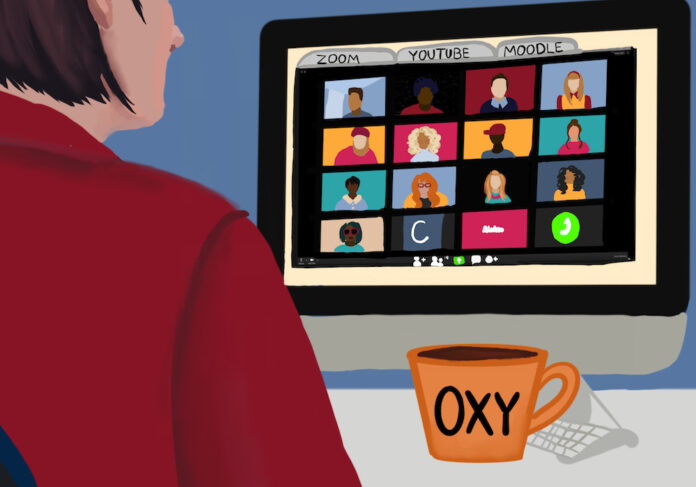Instead of in-person introductions, students in American Studies professor Heather Lukes’ classes introduced themselves online this fall using a format inspired by Vogue’s 73 Questions, a popular video series. According to American Studies and Writing & Rhetoric professor Julie Prebel, many faculty have creatively adjusted to Occidental’s online fall semester.
According to Prebel, faculty spent the summer learning how to redesign their curriculums and class structure to accommodate the difficulties of remote learning as a part of a pedagogy group. This group was headed by professor Carmel Levitan in the cognitive science department, and hosted discussions and workshops to help professors teach online. The committee has continued to meet about pedagogical methods, according to Prebel.
This semester, faculty had more time to prepare for and adapt to the new teaching format, whereas last spring course formats were forced to change on short notice, according to Prebel.
Philosophy professor Clair Morrissey said she has had to rethink the way she teaches and understands her role as a professor.
“I feel like I’ve changed almost everything about my teaching,” Morrissey said. “I don’t do lectures, taped or live. There’s study materials and assignments. I have tutorial sessions with small groups of four or five students once a week.”
According to computer science professor Justin Li, his remote lectures last spring were conducted via YouTube live streaming and he answered questions as they appeared in the live comments section. This semester, however, Li said he wanted students to be able to engage in classroom banter. For both his classes, Li began using Discord, a live instant messaging app, so students could communicate with one another. Li also uses the channel feature on the organizational app Slack, with separate channels for memes and office hour questions.
Professor Eileen Spain said she has realigned the focus of her chemistry labs on data analysis. According to Spain, she has been pre-recording herself conducting experiments and encourages her students to pay more attention to the data’s meaning, since they are unable to complete in-person labs.
“We spend a lot of time on data analysis and interpretation so we do build some other skills that way,” Spain said. “We’re still stressing [lab] safety which is an important aspect of lab curriculum. We videotaped ourselves in all of our equipment and [Personal Protective Equipment].”
According to German and linguistics professor Stephen Klemm, remote learning has been accompanied by a change in expectations on both sides.
“What I’ve tried to do is just slow things down, recognize that we’re not going to be able to get quite as much material done as we might otherwise be able to get done,” Klemm said. “[I want] everybody to kind of come together to realize this is going to be challenging [and] for us to be as generous as possible to our fellow students when we’re learning these new structures.”
Klemm said he is impressed by students’ energy levels in remote learning environments, despite the challenges of learning online.
Lukes said she has switched her classes to a “flipped classroom structure,” where the majority of the material is learned outside of the classroom and then discussed and engaged with during class meetings. However, she said this transition has been difficult. In a typical semester, Lukes’ lectures are live and there is a significant performative aspect to them as she responds to her students’ energy and reactions. In Lukes’ new flipped classroom, she said pre-recording lectures has made her feel more self-conscious.
“I just keep on starting and stopping the recording because I’m getting something wrong or I misstated something,” Lukes said. “I’m just not feeling it and so it’s taking so much more time right for me to do one PowerPoint.”
According to Prebel, she has been a strong proponent for alternative grading practices where students receive feedback from professors regarding how well they met the assignment guidelines, rather than receiving letter grades for assignments. In this alternate system, students would receive a contract grade based on their overall ability to comprehend feedback and apply it to their work instead of being assessed on individual assignments.
“Labor-based contract grading and specifications grading is a more equitable form of assessment for students,” Prebel said. “It reduces inequalities that are built into conventional grading processes.”
According to Prebel, this semester she is using a tutorial class model in which she meets with students in small groups. Prebel said she hopes her students view assignments as something she is engaging with them about, instead of judging them.
Li said he has eliminated deadlines completely, allowing students to submit worksheets when they are able, so students can work at their own pace.
“The worksheets are released twice a week, but they can turn it in whenever they want. We would give them feedback and they could just keep resubmitting,” Li said.
Prebel said her willingness to be online through the pandemic has shown her how much she loves teaching.
“You get off a Zoom call, and you’re just exhausted,” Prebel said. “It’s very draining but it makes me realize how much I love teaching. It makes me both so glad to be having contact with students on the one hand, and then also so sad that I don’t get the real thing.”
Klemm said he struggles with replicating the feeling of teaching to a room full of people in an online setting.
“There’s something about just having the emotions and the awareness of others and how they’re doing,” Klemm said. “There’s part of being physically together that I really, really miss.”
![]()































